Dear startup Community, we are excited to explore the insights from our recent interview with Christoph Hering, Director Innovation Center at AHK Greater China. He sheds light on the vibrant Chinese startup ecosystem and its attractions for German companies while also highlighting the considerable interest of Chinese startups in the German market.
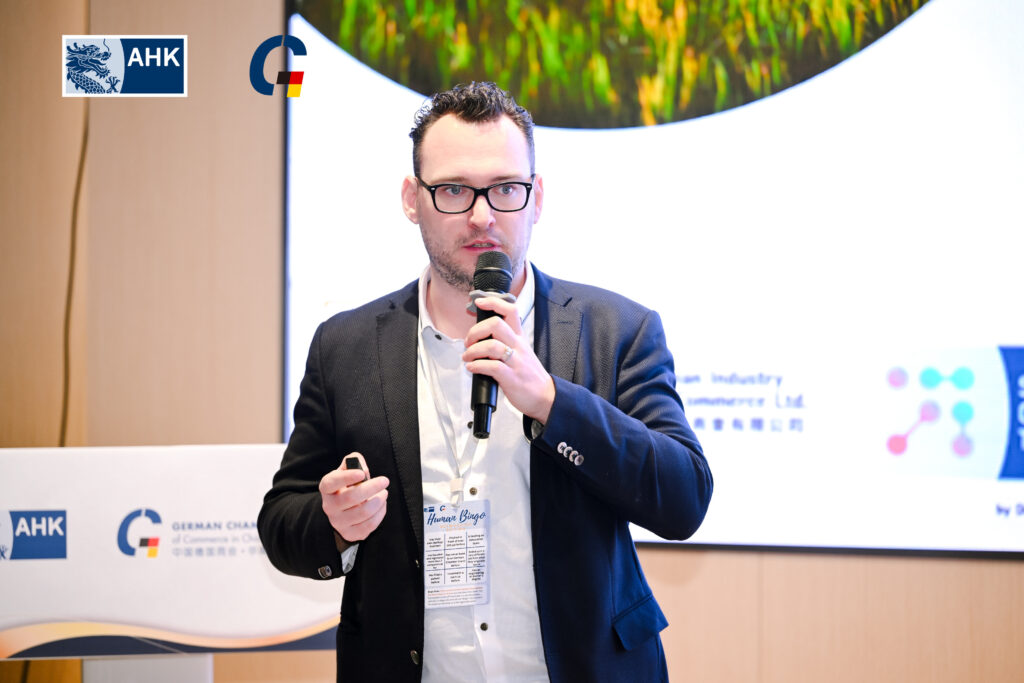
Christoph Hering at the AHK Innovation Night
Could you briefly introduce the AHK Greater China?
AHK Greater China is part of the German Chambers of Commerce Worldwide Network (AHK) which encompasses 150 offices in 93 countries and regions. As an official institution of Germany's foreign trade promotion, AHK Greater China has been representing the economic interests of German companies in China for over 25 years. The primary objective is to promote bilateral trade and investment between Germany and China by advising, supporting, and representing German companies looking to establish or expand their business presence in China. AHK Greater China’s main offices are located in Beijing, Shanghai and Guangzhou with seven more offices throughout the country.
Can you tell us something about the AHK’s involvement in the Start.up! Germany Tour?
Since 2019 AHK Greater China is part of the Start.up! Germany Tour (SUGT). We are responsible for the local selection of startups in China and Hong Kong. This year, 2024, we received over 50 applications from Chinese startups across different industries and sizes. We thoroughly reviewed all the teams and subsequently let the top 12 teams compete in a pitch competition. In the end, the team from “MechMind” in Beijing emerged victorious. In general, SUGT is a fantastic platform to get to know new innovative startups from various countries and regions. It also offers local startups the chance to introduce themselves to German companies, build new partnerships and potentially find customers or even investors.
How would you describe the Chinese start-up ecosystem?
The Chinese startup ecosystem, with its size, diversity, and innovative power, is a thrilling yet challenging prospect for foreign observers. The landscape can be likened to a jungle; success requires intense effort to penetrate the market. Many innovative startups remain under the radar, and without Chinese language skills and industry insights, discovery from the outside can be complex. Moreover, larger Western platforms such as techcrunch.com and LinkedIn are not prevalent in China, and Chinese startups are less likely to have websites or participate in international startup events, adding to their invisibility. Relationships and personal networks hold as much sway in Chinese startups as they do in business dealings, underlining the value of the right network partners and universities for gaining access.
The fact that only 3 to 4% of university graduates establish startups speaks volumes about the competition and financial struggles young founders face. Investors' high ROI expectations and risk aversion often lead to a landscape where the most successful entrepreneurs are in their mid-thirties to forties, armed with significant professional experience and robust personal networks. These founders, particularly those from large Chinese corporations like Alibaba and Huawei, can command vast startup capital and a ready customer base, often from their previous employers.
Chinese startups excel at rapidly transforming ideas into products and scaling existing products, driven by an impressive development speed. Innovation in China often involves multiple small adjustments to the product rather than massive breakthroughs. This agility and speed set Chinese startups apart, propelling their success on the national and global stages.
What makes the Chinese startup ecosystem attractive to German companies, and conversely, how does the German market appeal to Chinese startups?
The Chinese startup ecosystem presents several fascinating aspects for German companies. A notable facet is the rapid innovation speed of Chinese startups, which is largely due to their adoption of agile methodologies from the software sector. This 'fail fast forward' mentality, combined with excellent basic research and a worldwide lead in patenting new materials and processes, results in startups that are rapidly pushing the boundaries of technology. Furthermore, Chinese apps like WeChat, Dianping, and Meituan are fostering a significant digital shift. Through these platforms, Chinese startups can create and distribute new digitally networked products at a remarkable pace. This wealth of smart products interfaces with smartphones, providing German companies with a unique insight into the potential future of a digital society. However, the high competition level within China means that the successful startups are those that have not only managed to find a product-market fit but have also secured proper financing and developed strong teams. With the current economic downturn in China, these startups are now expanding into the global market, often outperforming local competitors in Southeast Asia, Latin America, and Africa.
On the other hand, the German market is appealing to Chinese startups as both an additional sales platform and a source of novel technologies. In addition to securing a larger market share, these startups are also looking to out-innovate their Chinese counterparts, using Germany's competitive tech environment to drive their own innovation. Germany is also popular for its good universities and central location in Europe. As a result, many Chinese startups choose Germany as their European headquarters. These benefits, however, come with the challenges of high employment costs, high taxes, complexity in bureaucracy, and sourcing suitable employees. The latter remains a significant obstacle, with many Chinese startups in Germany preferring to hire Chinese workers and German employees often leaving after a short tenure. Navigating these challenges is essential for Chinese startups wishing to establish a long-term presence in Germany.
In what ways do startups benefit from collaborating with AHK Greater China?
We offer a comprehensive network for Chinese startups to the German industry by helping them to win new customers, cooperation partners, and investments. Many of our members are actively looking for new partnerships and insights into the Chinese startup market. As AHK, we regularly organize events on the topic of innovation, host pitch events like SUGT, and provide a valuable networking platform. We are also in contact with several startups from Germany and China and invite founders as speakers for our events. In our Innovation Newsletter, we also regularly interview startups and present them. This year, 2024, we also offer a new program for AHK members, the AHK Innovators Club in China. In this program, we connect German companies with Chinese companies as mentor and mentee pairs to promote the exchange and innovative power of the participants. Thus, we offer Chinese startups a great opportunity to work with German companies, and for German companies to gain a better insight and understanding of the Chinese startup ecosystem.
About AHK Greater China
AHK Greater China is part of the German Chambers of Commerce Worldwide Network (AHK) which includes 150 offices in 93 countries and regions. As an official institution of Germany’s foreign trade promotion, AHK Greater China has been representing the economic interests of German companies in China for over 25 years. Its primary objective is to promote bilateral trade and investment between Germany and China by advising, supporting, and representing German companies seeking to establish or expand their business in China.
With main offices in Beijing, Shanghai, and Guangzhou and seven more offices throughout the country, the widespread presence enables the AHK to offer deep insights into the local business environment. The team of over 130 specialists are experts in their fields and have years of experience in helping German companies navigate the complexities of doing business in China.
The Start-up Germany Tour (SUGT) is a unique platform that brings together established companies and emerging start-ups to foster innovation and forge partnerships. This year, we are particularly excited about the inspiring success story of the collaboration between VAHLE and ELONROAD, which began at SUGT 2021 and continues to this day.
The VAHLE Group is a leading global supplier of power, data transmission and automation systems for mobile industrial applications. With more than a century of experience and a team of more than 750 employees, VAHLE has established its products and services in 52 countries worldwide. The meeting between Vahle and ELONROAD at SUGT was a pivotal moment. To gain a deeper insight into the successful partnership between Vahle and ELONROAD, we spoke to Jaroslaw Warzecha, Operations Manager Systems Business at VAHLE.
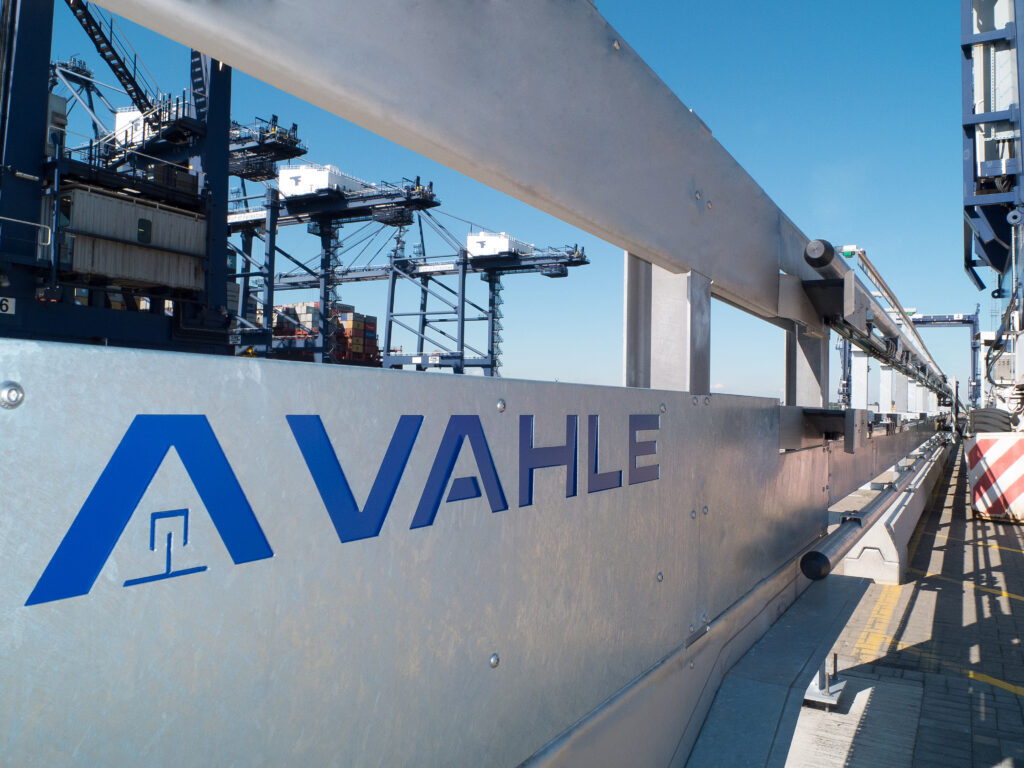
Why did you attend the SUGT as a spectator?
"Originally, we were looking for new ideas and innovative approaches for our products and services in 2019. The SUGT seemed to be the ideal platform to network with the emerging startup scene and find potential cooperation partners. After our first participation we continued every year."
Why are you interested in (international) start-ups?
"International start-ups often bring fresh perspectives and innovative solutions that are of great value to our industry. Their agility and creativity can help challenge traditional approaches and show new ways forward.”
How did you get to know ELONROAD - what was so exciting about this start-up for you?
"ELONROAD immediately caught our attention at SUGT, 2021. Their vision of equipping roads with intelligent conductor rails for electrification perfectly matched our interest in innovative energy systems. Their concept was not only technologically fascinating, but also promised to offer a sustainable solution for the mobility of the future.”
What have been the subsequent joint activities? Where are the points of contact?
"After our first meeting at SUGT, we undertook numerous activities with ELONROAD. From visits to Sweden to joint appearances at exhibitions, we have worked intensively together to develop innovative solutions and shape the future of mobility. The main points of contact have been our common interest in sustainable technologies and the electrification of transport routes.”
What's next for your joint story?
"We are currently working on an exciting project that will bring our shared visions to life. Details will be announced soon, but we can already say that it will be another important milestone in our cooperation.”
The story of VAHLE and ELONROAD is an inspiring example of how the Start-up Germany Tour brings companies and startups together to shape the future. We would like to thank Jaroslaw Warzecha for his insights into the fascinating development of the partnership between VAHLE and ELONROAD. Their collaboration is a shining example of how the SUGT brings companies and start-ups together to shape the future. We encourage other companies to join the Startup Germany Tour 2024 and take advantage of the opportunities that cooperation with startups offers.
Learn more about ELONROAD
Since the first electrical vehicles entered the market more than a decade ago, the question on everyone’s minds has been – ”How far can you drive?” Batteries are expensive and take up a lot of space. Batteries, costly yet pivotal, create a barrier to widespread adoption. At Elonroad, we're determined to change this narrative.
In the heart of innovation, inspiration often strikes unexpectedly. For our founder, Dan Zethraeus, that moment of insight came on a snow-laden road. A radical idea crystallized as slush accumulated between the wheels: "Could we charge electric vehicles differently?" Armed with a basic understanding of electrical engineering and boundless imagination, Dan embarked on a journey redefining transportation as we know it.
"It got me thinking," recalls Dan, his eyes alight with passion. "Perhaps you could build a rail there to conduct electricity under my car?" With a handful of Lego bricks and a mind buzzing with possibilities, he created the first prototype.
At that moment, our electric road system was born, transcending the limitations of conventional charging stations.
Our story is not just about wires and circuits; it's about inspiring change.
Learn more about the VAHLE Group
The VAHLE Group develops high-quality energy, data transmission and automation systems that are used in mobile industrial applications worldwide. Quality, dynamism, innovation and passion are the cornerstones of our actions. In 1912, Paul Vahle launched the first copper conductor rail on the market, laying the foundation for a company that today has over 750 employees and offers its products and services in 52 countries worldwide. In addition to our headquarters in Kamen, with production and development facilities, we develop new automation solutions at our competence center in Schwoich (Austria). Our portfolio includes products from the fields of energy transmission, data communication, positioning and control. Our flexible solutions are primarily aimed at customers in the automotive, intralogistics, port technology and crane technology sectors.
The Start.up! Germany Tour presents a unique and invaluable opportunity for startups by providing a platform to connect with potential partners and investors. On the flip side, it also offers established corporations the chance to learn from, exchange ideas with, and network within the vibrant startup scene. Such synergies are also harnessed by Evonik, a well-established name in the specialty chemicals industry. We had the opportunity to interview Viviane Winter, who works in digitalization strategy at Evonik, and gathered some exciting insights to share with you.
Stay tuned for an engaging behind-the-scenes look at Evonik's experiences as part of the Start.up! Germany Tour.
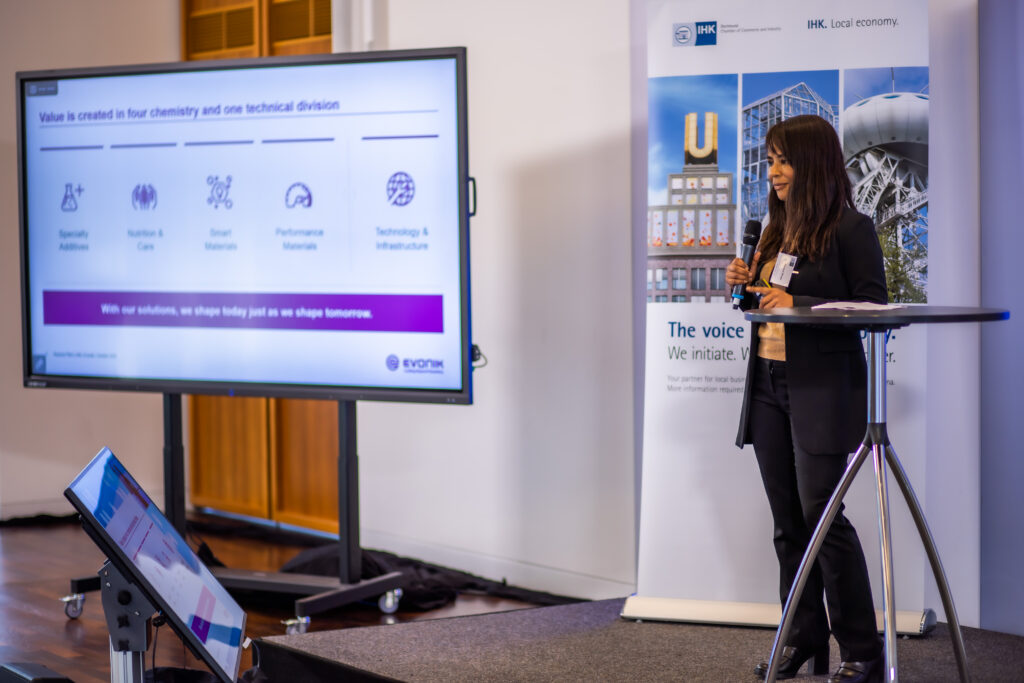
Viviane Winter at the Reverse Pitch of the Start.up! Germany Tour 2022
What drew Evonik to participate in the Start.up! Germany Tour?
As an innovation unit at Evonik, our objective is to cultivate a broad ecosystem for collaboration. The Start.up! Germany Tour facilitates this by connecting us with diverse startups from various sectors. The innovative ideas and trends emerging from the startup scene greatly inspire us. Particularly, the international scope broadens our perspective, inviting fresh insights and fostering productive cross-cultural interactions, which is a vital aspect of our participation.
How does Evonik benefit from collaborating with startups?
Startups are known for their fresh, innovative approach and their ability to think out of the box. Collaborating with startups offers us a unique advantage in exploring new horizons. Furthermore, it also makes sense in an economical way for both sides in case that the use cases match. Startups, with their flexible approach, can bring a novel perspective to our established processes. These collaborations bring value to our work by offering cost-efficient opportunities to work on innovative projects and the startups get the chance to gain insights into how we as a corporate work.
What areas are of particular interest to Evonik when collaborating with startups?
We're interested in startups playing in the field of (generative) AI in chemistry, e.g. to support lab work and to shorten innovation cycles by using data. The areas of sustainability and circular economy also show promising opportunities for collaboration with startups. Ultimately, the relevance of the use-case presented by the startup decides the potential for collaboration.
How does the Start.up! Germany Tour enhance the partnership between Evonik and startups?
Personal contact is a crucial element in nurturing collaborations. The Start.up! Germany Tour offers a platform where corporates can engage face-to-face with startups, paving the way for effective communication and deeper understanding. This allows us at Evonik to build fruitful collaborations by connecting directly with startups that have relevant use-cases. It also presents an opportunity for startups to network and learn from industry veterans. Once we have established a personal connection, startups can reach out to me, for instance, via LinkedIn. But it's essential that I've had the chance to form an impression of the startup and that we've already exchanged first ideas.
NRW is located in the middle of Europe and is the most populous and one of the most densely populated of the 16 federal states of Germany. The most important metropolitan area is the Rhine-Ruhr area with more than 10 million inhabitants. The cluster policy of the state government of North Rhine-Westphalia promoted the cooperation of companies, research institutions and the public sector along value chains in the most important sectors and technology fields.
NRW - Business location figures
Main facts about NRW as a business location
- 18 million inhabitants (21,5% of Germany)
- 710,000 small and medium-sized enterprises (KMUs)
- every fourth market leader comes from North Rhine-Westphalia
- In 2022, 20.5% of the gross domestic product was generated in NRW with € 793.8 billion
Detailed facts about NRW as a location for life science
10. 8% of the total German turnover of the biotechnology industry is generated here by 118 core biotechnology companies with more than 5,780 employees. In addition, NRW has the largest number of biotechnological patent applications in Europe.
More than 500 life science companies, including 118 with a proven focus on biotechnology, mark the country as a leading innovation centre in Europe.
NRW also has the highest density of scientific and top research institutions in Germany. The scientific landscape in the field of biotechnology in NRW comprises 56 universities and non-university research institutions.
In the academic year of 2019/2020 40% of the students in NRW studied one of the STEM subjects (natural sciences, technology, engineering, mathematics). In the field of biotechnology, students can specialize in cell biology, (bio) medicine, biochemistry, genomics, proteomics, metabolomics, molecular biology, systems and synthetic biology, analytics/ microsystems, bioinformatics, and process engineering.
In addition, 14 Clusters of Excellence in Germany are funded in NRW. Among them are five that deal with topics in the field of the bioeconomy or life sciences. In addition to the highest density of universities in Germany, the four major German research organizations (the Fraunhofer-Gesellschaft, the Helmholtz Association, the Leibniz Association, and the Max Planck Society) operate here.
NRW as a business location for the life sciences
Fixed elements of NRW corporate landscape are internationally established giants such as the biotechnology companies Qiagen and Miltenyi Biotec or Bayer, UCB, Henkel and Evonik Industries from the pharmaceutical and chemical industries. In addition to these global players, NRW is home to dynamic small and medium-sized enterprises (SMEs) such as AiCuris, Biofrontera, Paion, Sartorius Xell, ProtaGene, Lead Discovery Center, Taros Chemicals, Chimera Biotec and many others.
Large companies and SMEs are complemented by numerous young start-ups such as Numaferm, Priavoid, b. fab, SenseUp, Bex-Biotec: this small selection shows the innovative power of North Rhine-Westphalia as a biotechnology location.
NRW - Growth-promoting environment
Founders have many opportunities to exchange ideas with like-minded people and potential business and cooperation partners. Numerous advisory services and accelerator programs in NRW offer support.
Here are just a few of the offers in NRW:
BIO NRW
BIO. NRW is a central catalyst for the sustainable development of the strengths of North Rhine-Westphalian biotechnology and bioeconomy. The key aspects of BIO. NRW are: Effective network for scientists, founders and entrepreneurs, Central platform for life science topics, promotion of students and young talents, and support for start-ups and SMEs in financing and internationalization.
BioIndustry
Service association with international standards
BioIndustry e.V. is a networked and integrated service cluster of companies, research facilities, training and further education institutions, technology centers, biotechnological service companies and municipal economic development agencies with a focus on the Ruhr region and Westphalia.
MEDECON Ruhr
MedEcon Ruhr is the network of the healthcare industry in Germany's largest conurbation, the Ruhr healthcare metropolis.
More than 170 companies and institutions from the hospital industry, healthcare and healthcare research as well as the supplying industries are connected through their membership in MedEcon Ruhr association.
ZENIT
On behalf of the EU, the federal government and the state, Zenit, with more than 60 employees, supports small and medium-sized technology-oriented companies in their innovation and internationalization activities and brings together potential partners from industry and science. But start-ups, fast-growing and large companies are also part of our customer base. Technology and knowledge-based start-ups are important drivers of innovation in the digital transformation, life science and circular economy. ZENIT provides support in the areas of market access, business model validation, financing, human resources and internationalization. Topics that the start-up team at ZENIT has competently covered for many years. For start-ups that want to establish new ideas and innovations in the market, the team offers a variety of tools and methods.
Innovation competition “Gesünder.IN.NRW”
The innovation competition “Gesünder.IN.NRW” focuses on funding innovative solutions in the knowledge- and research-intensive fields of cutting-edge medicine, medical engineering, life sciences, nutritional science, and pharmacy. The aim is to promote a climate-friendly, environmentally friendly, and resource-conserving health care and health economy in NRW.
Funding is provided for research, innovation, and development projects with a focus on three priority topics, including innovative medicine and life sciences, health, and nutrition. Creative concepts and ideas are being sought that provide disease prevention solutions and new treatment options – using digitalization and biotechnology tools as important key and interdisciplinary technologies.
Many of today's successful young biotechnology companies started out as university spin-offs. NRW has numerous technology and start-up centers, some with different focal points. A total of 155 biotech and life science companies are currently located in 22 of them.
These “incubators” for start-up companies are usually located near research institutions and aim to provide an efficient infrastructure for the transfer of scientific know-how into marketable products and processes. Just to name some of them: BioMedizinZentrumDortmund, LSC-LifeScienceCenter Düsseldorf, BioCampus Cologne, Pharma- und Chemiepark Wuppertal or BioZ-Biotechnologiezentrum Münster.
“Next to the major players, it’s especially the start-ups and SMEs that develop new processes and products to help shape and manage the resource transformation. This in turn contributes to North Rhine-Westphalia’s continuing success as a leading industrial region.” (Mona Neubaur, Minister for Economic Affairs, Industry, Climate Action and Energy of the State of North Rhine-Westphalia)
NRW as a place for life science start-ups
NRW is the right location for any company, but especially for international companies that want to expand or establish themselves in new markets.
The location has a network of great partners who share their access, resources and knowledge in their respective networks. When it comes to financing, NRW.BANK is one trusted source of funding in NRW.
In addition to the strong chemical and pharmaceutical industries, numerous successful start-ups and spin-off companies thrive in NRW. This entrepreneurial excellence is supported by the densest network of academic institutions in Europe.
To promote start-ups from universities, the Ministry of Economic Affairs, Climate Protection and Energy of the State of North Rhine-Westphalia supports the Exzellenz-Gründerzentrum.NRW. The initiative aims to strengthen the start-up culture and thus improve technology transfer. Six universities receive 150 million euros in funding over five years, just as the Center für Entrepreneurship & Transfer in Dortmund.
In addition to that there is a rich and solid funding environment to support and promote the industry, including venture capitalists and business development agencies. North Rhine-Westphalia is becoming an increasingly attractive destination for startup financing! According to the EY Startup Barometer Germany from July 2023 (EY Startup - EY Startup-Barometer Germany – July 2023), NRW ranks third in the number of financing rounds nationwide behind Berlin and Bavaria, with 13% of all financing rounds in Germany taking place in NRW.
Even more impressive, NRW is one of the few federal states that has increased the number of financing rounds in the first six month of 2023 compared to the previous year. Additionally, in terms of financing volume, NRW ranks a strong fourth behind Berlin, Bavaria, and Hamburg. These figures are a testament to the growing ecosystem for startups in North Rhine-Westphalia and the state's commitment to investing in innovation.
Many start-ups also benefit from the technology or start-up centers in NRW. Business incubators act as a catalyst for economic development and promote the transfer of technology from idea to market. They promote business start-ups and subsequently support them to ensure their survival and growth. The specific services provided by the centers include providing affordable laboratory and office space, arranging business contacts, advising on financing options and providing advice on setting up or relocating a company.
NRW is not only the most populous and economically strongest federal state in Germany, but also offers an excellent transport infrastructure that connects all major European markets. Whether by road, rail, water or air, NRW offers you optimal transportation options for your goods and services.
As a center for innovation and digitalization in the logistics sector, here you will find qualified specialists, renowned research institutions and strong networks that will help you to optimize your processes, reduce your costs and increase your competitiveness.
NRW's geographical location, technological expertise and economic dynamics make it an ideal logistics location.
Nine top logistics companies have their headquarters in NRW (including Deutsche Post DHL, Rhenus, FedEx, Arvato, Schenker AG)
NRW - Business location figures
Main facts about NRW as a business location
- 18 million inhabitants (21,5% of Germany)
- 710,000 small and medium-sized enterprises (KMUs)
- every fourth market leader comes from North Rhine-Westphalia
- In 2022, 20.5% of the gross domestic product was generated in NRW with € 793.8 billion
Detailed facts about NRW as a business location for logistics
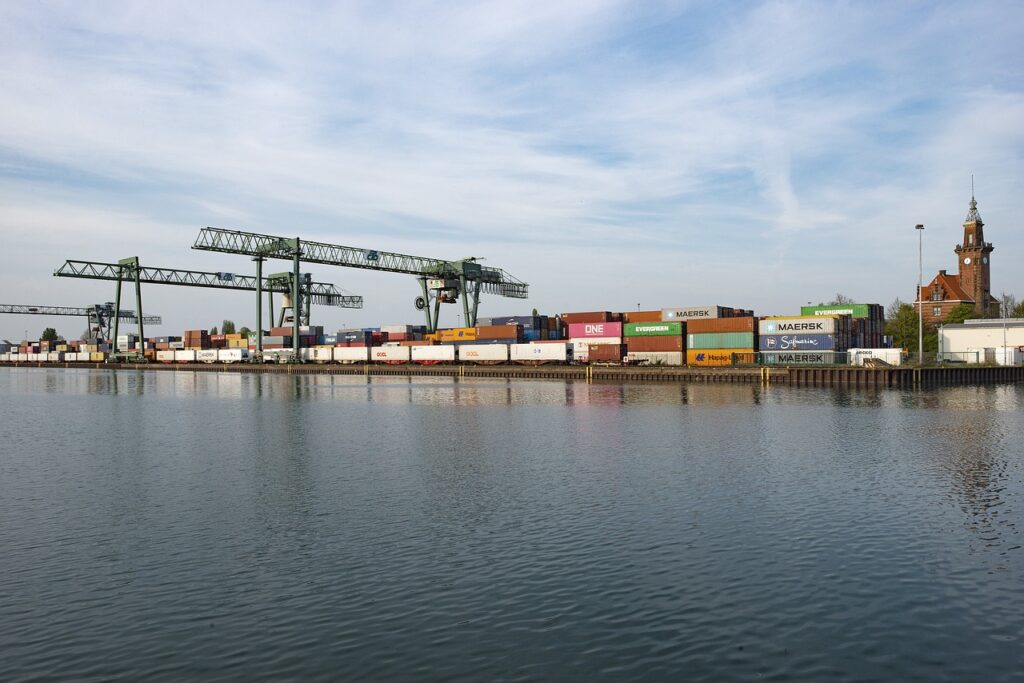
The state also has around 720 kilometers of waterways and 120 inland ports that handle a good 115 million tons of goods every year. The Port of Duisburg is the world's largest inland port and Dortmund is home to Europe's largest canal port.
Nowhere else in Germany is the highway network as tightly knit as in NRW. With almost 150 million consumers within a radius of around 500 kilometers, logistics reaches around a third of the EU population within a daily truck distance.
Around 24,000 logistics companies based NRW generate an annual turnover of approx. 67 billion euros. Almost 350,000 people are employed in the core logistics sector. If other logistics sectors are included, the figure rises to 712,000.
In 2014, the World Bank named Germany the most efficient logistics location in the world for the first time. In 2016 and 2018, Germany was again ranked first in the “Logistics Performance Index”. In the accompanying global survey “Connection to Compete”, freight companies and express carriers chose Germany as number one among 160 countries. With this award, however, they paid special tribute to North Rhine-Westphalia, the leading location for logistics in Germany.
NRW is also a focal point for start-ups. Here you will find numerous start-up companies developing innovative solutions for the logistics industry. NRW has already been able to attract 20% of all start-ups active in Germany, delivering even more radical innovations to the local industry and enabling local companies to take full advantage of the practical insights and modernization associated with the start-up scene.
NRW- Improvement through education and research
In addition to space, NRW offers great scientific and research institutions that promote innovation and a highly qualified talent pool in the region. For example, RWTH Aachen University, TU Dortmund University, Neuss University of Applied Sciences, the University of Duisburg-Essen and TU Cologne train their students in various areas of logistics. A wide range of different degree programs and training occupations in the field of logistics in NRW ensures that the industry benefits from new theories.
NRW is home to a number of important research institutes and chairs dealing with the subject of logistics. Around 4,800 students are enrolled in the 45 logistics courses in NRW including technical logistics, digital logistics, trade and production logistics. Two universities made it to the podium in the university ranking in 2020: The University of Duisburg-Essen once again took the top position in the university ranking in the nationwide student competition Logistics Masters 2020.
The Fraunhofer Institute for Material Flow and Logistics IML in Dortmund is the world’s largest and most respected research institute for logistics issues. It advises companies of all industries and sizes on issues related to material flow and logistics and manages the “Internet of Things”. The Digital Hub Logistics as part of the Digital Hub Initiative of the Federal Ministry for Economic Affairs and Climate Protection is also located at Fraunhofer IML.
NRW - Growth-promoting environment
Founders have many opportunities to exchange ideas with like-minded people and potential business and cooperation partners. Numerous advisory services and accelerator programs in NRW offer support.
Here are just a few of the offers in NRW
E-port Dortmund
The e-port-dortmund, foundation and competence center for logistics and information technology at the Port of Dortmund, promotes the establishment of innovative start-ups and existing companies in the logistics sector. Flexible office space, office and network services, consulting services and a strong partner network are available to them. Here, start-ups can utilize synergies and actively shape the logistics industry
NRW.Global Business
NRW.Global Business is responsible for international location marketing for Germany's No. 1 investment location, North Rhine-Westphalia, and attracts foreign direct investment to the region worldwide. Germany's economically strongest federal state is already home to around 22,000 foreign companies. The experts at NRW.Global Business support investors with tax and legal issues and provide detailed information on the economic structure and industry clusters. They analyze investment projects, identify suitable locations and accompany an investment project from the first step through to successful establishment and beyond.
Startport
Startport is an innovation platform for logistics and supply chain topics. Together with their strong network of industry, start-ups, venture capital and research, they drive forward innovations in logistics and supply chain. At the heart of logistics in the region, the Port of Duisburg, startport and its young entrepreneurs are harnessing technology to create real value through innovation. Based on their already extensive network, they offer startups many advantages, such as matchmaking with potential customers, active support through coaching and projects, as well as flexible office space and access to many venture capital funds and business angels.

There are many great funding opportunities for startups, such as the Centers of Excellence NRW, which facilitate the transfer of theoretical and scientific findings into operational reality. The centres are currently being funded with 116 million euros to help young entrepreneurs set up startups in the region. Another example is the start2grow initiative in North Rhine-Westphalia and Dortmund, which actively supports and promotes young startups, networks and rewards them.
To support the industry, the state government supports the Competence Network Logistik. NRW. In the Competence Network Logistics. NRW, around 180 companies and 20 scientific institutions as well as numerous intermediary actors are working on logistics solutions for future challenges. In particular, logistics 4. 0, digital networking in the supply chain, AI and autonomous logistics, multichannel logistics, climate protection and, currently, resilience in the event of pandemics play a role. It is supported by the associations LOG-IT Club e. V. and the Verband Verkehrswirtschaft und Logistik e. V. (VVWL).
NRW also offers large areas for the logistics and mobility industry, which are available on more than 205 hectares for new commercial areas. In addition, the government and ministries in NRW are important partners in these projects, which actively support new and existing companies. The state played a major role in the realisation of the new park projects on Datteln, Waltrop and Gelsenkirchen as well as in the creation of industrial parks and zones for small and medium-sized enterprises in the Rhine-Ruhr region.
The state is supported by NRW.BANK when it comes to business development. This advises start-ups on funding and grants suitable loans if required. Different funding programs are specialized for different industries. Real experts will find a tailor-made financing program for the respective start-up.
Even during the coronavirus pandemic, the state of NRW has placed particular emphasis on preserving start-ups. In the first edition of the corona aid program, NRW.BANK granted a total of EUR 21.6 million to 112 start-ups, which meant an average amount of just under EUR 193,000. This coronavirus aid consisted of convertible loans with a term of six years and an interest rate of 6%, which are deferred until maturity or conversion. No collateral was required for the convertible loans.
NRW - The location for start-ups
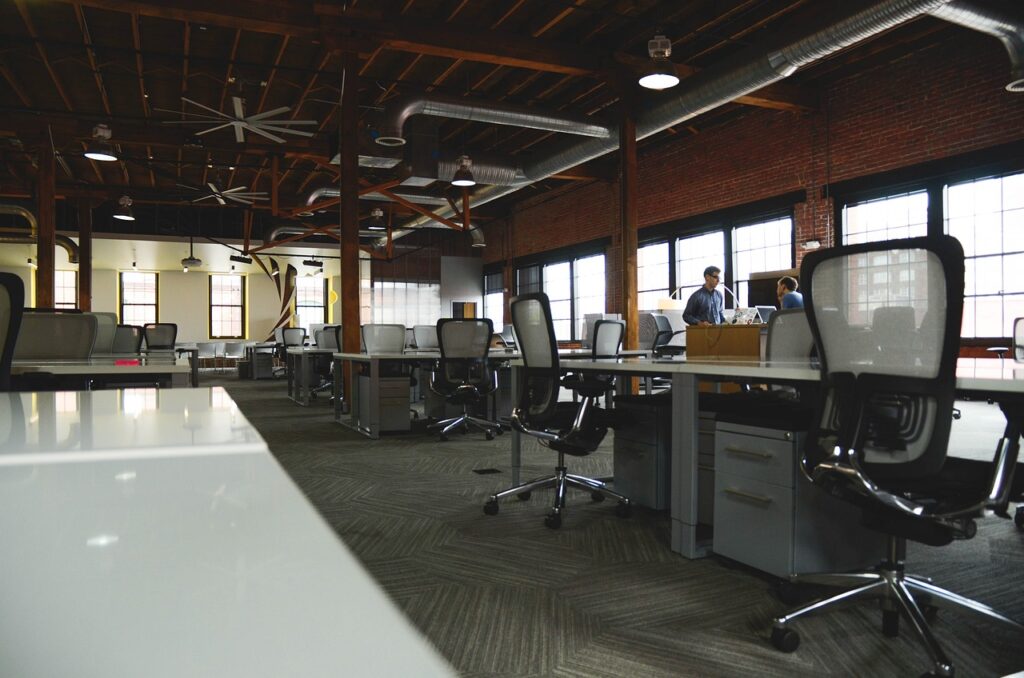
NRW is the right location for any company, but especially for international companies that want to expand or establish themselves in new markets.
The location has a network of great partners who share their access, resources and knowledge in their respective networks. When it comes to financing, NRW.BANK is one trusted source of funding in NRW.
Beside this North Rhine-Westphalia is becoming an increasingly attractive destination for startup financing! According to the EY Startup Barometer Germany from July 2023 (EY Startup - EY Startup-Barometer Germany – July 2023), NRW ranks third in the number of financing rounds nationwide behind Berlin and Bavaria, with 13% of all financing rounds in Germany taking place in NRW. Even more impressive, NRW is one of the few federal states that has increased the number of financing rounds in the first six month of 2023 compared to the previous year. Additionally, in terms of financing volume, NRW ranks a strong fourth behind Berlin, Bavaria, and Hamburg. These figures are a testament to the growing ecosystem for startups in North Rhine-Westphalia and the state's commitment to investing in innovation.
The location also offers several organizations such as the Digi.Hubs NRW, Startercenter NRW, InsurLab Germany and the Startup Region_OWL. These organizations cover all areas of founding and further development.
Especially the network of local chambers of industry and commerce (IHK) in Germany is an important partner of the German economy and offers a wide range of services and advice for local companies.
Even in times of crisis, the state has shown that innovation is maintained through support.

The basis for the success of industry was already laid in Germany in the course of the Industrial Revolution in the coal-rich region of North Rhine-Westphalia. The economic success of that time has shaped NRW to this day.
NRW as a region has set itself the goal of being a pioneer in the fields of technological innovation for industrial solutions in the future.
NRW is also one of the few locations in the world that still has a complete industrial value chain. Characteristic is the unique mix of specialized small and medium-sized enterprises to large medium-sized enterprises and large companies. These companies are united by a high degree of internationalization, ranging from the basic material industries to specialized suppliers and large system providers in leading markets with strong growth.
NRW - Business location figures
Main facts about NRW as a business location
- 18 million inhabitants (21,5% of Germany)
- 710,000 small and medium-sized enterprises (KMUs)
- every fourth market leader comes from North Rhine-Westphalia
- In 2022, 20.5% of the gross domestic product was generated in NRW with € 793.8 billion
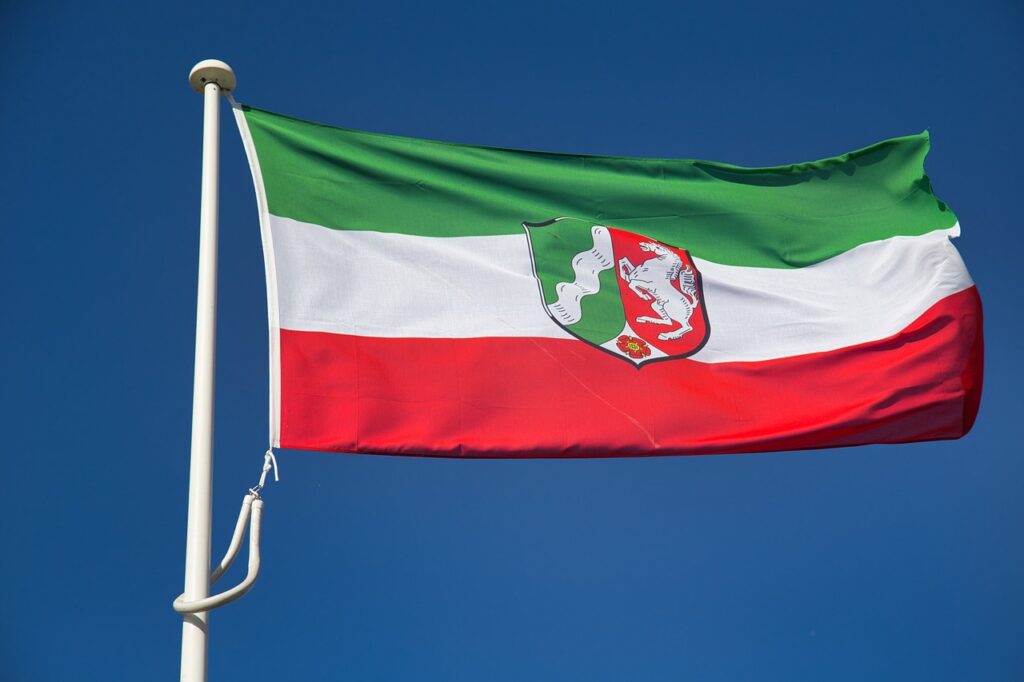
Detailed facts about NRW as an industrial location
NRW has already attracted 20 percent of all startups operating in Germany and has delivered even more radical innovations to the local industry, enabling local companies to take full advantage of the practical knowledge and modernization of the startup scene.
An example of such a radical innovation is the field of nanotechnology. Already 22% of German nanotech companies have established themselves in NRW, as well as 28% of all microsystems and technology companies.
In addition, 25,000 ICT companies have already established themselves in NRW. They generated almost a third of all IKT revenues generated in Germany, amounting to more than 103 billion euros.
NRW - From pioneer to expert in the field of Industry 4.0
As the industrial heart of the continent and Germany, NRW is home to a truly broad industrial customer base, encompassing everything from chemicals and mechanical engineering to electronics and electrical engineering. So there is a niche for everyone to drive and expand their own business. In addition to the potential German industrial customer base in NRW, the state also offers quick access to over 160 million people within a 500 km radius, who have a purchasing power of around 3.5 billion euros.
NRW offers immense opportunities for all companies and start-ups that want to contribute to innovative industrial solutions and make the fourth industrial revolution not only a reality, but also a success story.
In order to network processes along the value chain, the future belongs to technologies such as IT platforms, digital twins and machine learning.
In order to further expand and improve processes, start-ups benefit from the leading research and educational institutions in NRW, for example. They offer young and innovative companies an ideal breeding ground to test and further develop their ideas. They benefit from the exchange between scientific findings and practical needs and applications. These research institutions include the Fraunhofer Institutes such as Fraunhofer FIT or the Centrum Industrial IT (CIIT e. V.).
NRW is also a particularly attractive location due to current developments in the field of AI.
One player in the region that is committed to the advancement of artificial intelligence is KI.NRW. In cooperation with local players from politics, civil society, business and science, KI.NRW is actively using AI. One such program is the application of AI in hospitals or in mobility, which is not only changing industries but also creating smart cities.
These advances are also one reason why NRW is already a leader in language mode research and machine quantum learning.
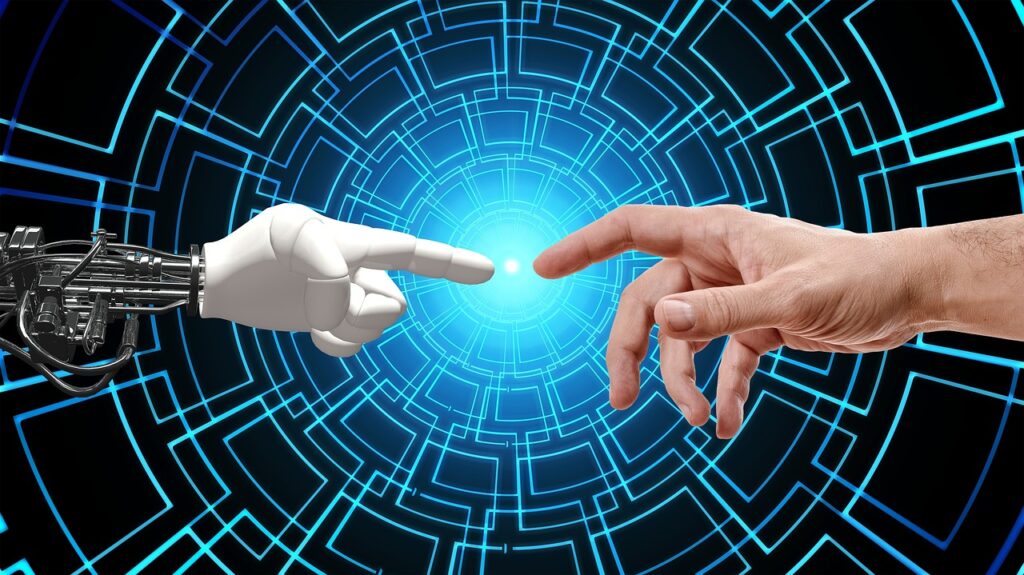
NRW - Progress through education
There are currently over 750,000 students in NRW studying at one of the 68 universities in the region, such as TU Dortmund University, Ruhr University Bochum or RWTH Aachen University. Around 27% of these students study at universities of applied sciences, which guarantees a well-trained workforce.
NRW - Growth-promoting environment
Founders have many opportunities to exchange ideas with like-minded people and potential business and cooperation partners. Numerous advisory services and accelerator programs in NRW offer support.
We present just a few of them here.
Dig. Hubs NRW (Aachen, Bonn, Düsseldorf Rheinland, Münsterland, ruhrhub)
With its Startup Fellowship and Accelerator Program, the Digital Hubs support startups and intrapreneurs with growth potential in networking with universities, established companies and investors. The scaling program Scaleup.NRWsupports high-growth start-ups from North Rhine-Westphalia.
Startercenter NRW
Initiated by the IHK, the Chambers of Crafts and the municipal economic development agencies, 75 starter centers support founders with information, advice and training. The formalities can also be handled flawlessly with the help of the experts.
InsureTech is a major topic in Cologne. Founders from the fields of e-payment, blockchain, IoT, e-health, virtual reality and big data meet here. The transfer of knowledge from universities into practice is promoted.
Startup Region OWL
The network brings together founders and entrepreneurs from East Westphalia-Lippe. Initiated by the Founders Foundation Bielefeld and supported by the state government, the region wants to make its attractive start-up ecosystem known beyond the regional borders.
A general overview of the startup ecosystem can be found here: https://startups.nrw/
The state is supported by NRW.BANK when it comes to business development. This advises start-ups on funding and grants suitable loans if required. Different funding programs are specialized for different industries. Real experts will find a tailor-made financing program for the respective start-up.
Even during the coronavirus pandemic, the state of NRW has placed particular emphasis on preserving start-ups. In the first edition of the corona aid program, NRW.BANK granted a total of EUR 21.6 million to 112 start-ups, which meant an average amount of just under EUR 193,000. This coronavirus aid consisted of convertible loans with a term of six years and an interest rate of 6%, which are deferred until maturity or conversion. No collateral was required for the convertible loans.
NRW - The overall package for start-ups in industry
NRW is the right location for any company, but especially for international companies that want to expand or establish themselves in new markets.
The location has a network of great partners who share their access, resources and knowledge in their respective networks. When it comes to financing, NRW.BANK is one trusted source of funding in NRW.
NRW has the largest share of foreign direct investment among all federal states. Almost every third euro invested from abroad flows to NRW. Actors such as NRW. Global Business attracts foreign direct investments to the region.
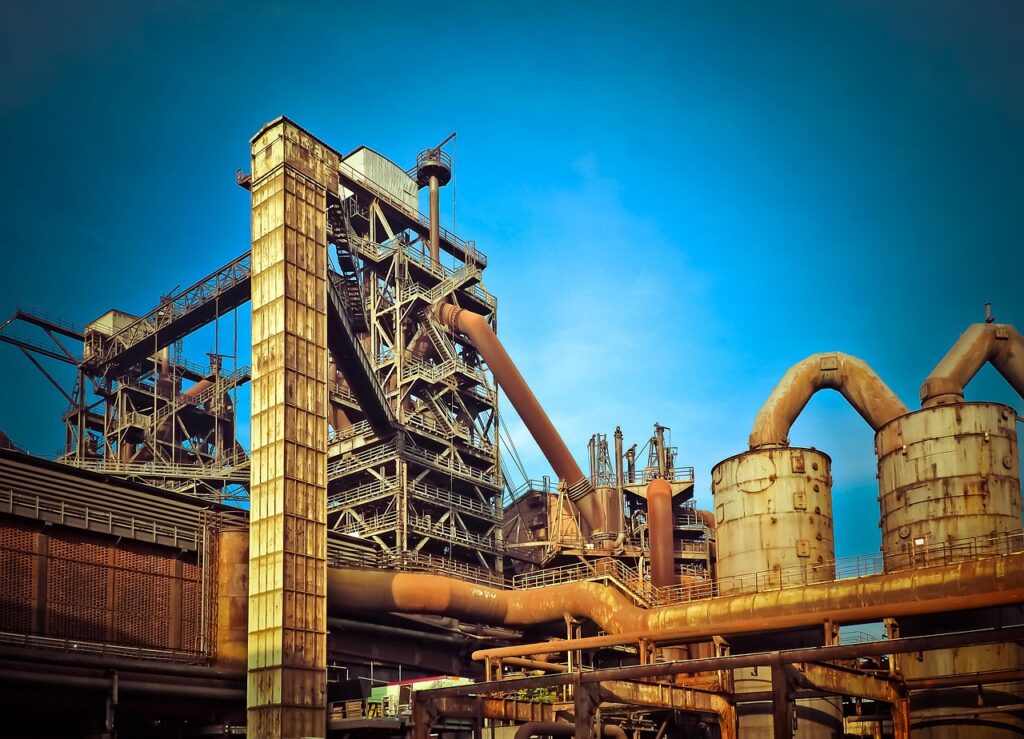
Beside this North Rhine-Westphalia is becoming an increasingly attractive destination for startup financing! According to the EY Startup Barometer Germany from July 2023 (EY Startup - EY Startup-Barometer Germany – July 2023), NRW ranks third in the number of financing rounds nationwide behind Berlin and Bavaria, with 13% of all financing rounds in Germany taking place in NRW. Even more impressive, NRW is one of the few federal states that has increased the number of financing rounds in the first six month of 2023 compared to the previous year. Additionally, in terms of financing volume, NRW ranks a strong fourth behind Berlin, Bavaria, and Hamburg. These figures are a testament to the growing ecosystem for startups in North Rhine-Westphalia and the state's commitment to investing in innovation.
Especially the network of local chambers of industry and commerce (IHK) in Germany is an important partner of the German economy and offer a wide range of services and advice for local companies.
Even in times of crisis, the state has shown that innovation is maintained through support.

From the Start.up! Germany Tour to successful expansion - Sensoneo seizes the opportunity to be present in Germany
It's that time of year again - the Start.up! Germany Tour is going into its next round, offering young companies from all over the world the opportunity to network with investors, network partners and potential customers from Germany. To give you an exclusive insight into the tour, we interviewed Martina Susova from Sensoneo, PR & Communication Manager, one of the start-ups that took part in our 2019 Start.up! Germany Tour.
Martina, first of all, give us some insights about you and Sensoneo.
I got to know the start-up Sensoneo in 2019, when I accompanied them to the Start.up! Germany Tour 2019 as a representative of the German Chamber of Commerce (AHK). I was already convinced of the founding idea and was sure that the Start.up! Germany Tour was a unique opportunity for Sensoneo. When the founders Martin Basila and Andrea Basilova asked me this year if I would like to work for Sensoneo as PR and Communications Manager, I was immediately convinced.
At Sensoneo, we offer innovative waste management solutions and use state-of-the-art technology to help municipalities manage their waste more effectively and efficiently, thereby reducing their environmental impact. The first idea for Sensoneo came in 2014, when the founders developed the first prototype of a sensor and the software solution. Since then, we have reached many milestones and successfully implemented more than 500 projects in over 8 countries. Recently, we even received the "Energy Globe Award" for our innovative solutions in the field of waste management with our unique software system for deposit return systems. This is of course a special honor for us. We are also currently building the world's largest intelligent waste system, which will be commissioned in Madrid later this year.
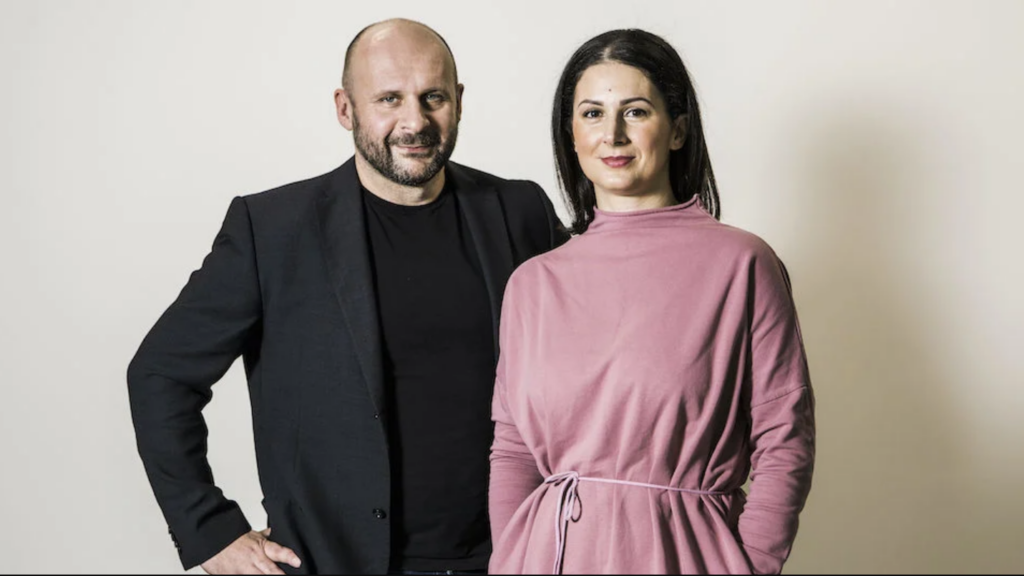
And now to the Start.up! Germany Tour and your participation in 2019. What was the background of your participation and what added value did the tour bring you?
Participating in the Start.up! Germany Tour was a great opportunity for Sensoneo to meet key stakeholders such as investors and potential customers and to market itself. As a young company, the tour provided us with an excellent opportunity to further expand our network in Germany. In this context, I would like to emphasize the B2B matchmaking, which brought us together with relevant stakeholders in the field of factory waste management. This also shows how intensively the IHK engages with its participants in the run-up to the event and invites relevant contacts in order to offer the start-ups real added value. In this way, we were able to lay the foundation for new partnerships and establish contacts with relevant multipliers in Germany. We are still in close contact with many of them and are excited to see what the future will bring!
Can you give us a brief outlook on your future plans?
We see a lot of potential in Germany and want to expand our presence. Especially to better serve our existing customers in Germany. The Start.up! Germany Tour has already given us the opportunity to look at some locations in NRW, and we now want to focus more on that. Of course, this also goes hand in hand with our goal of establishing ourselves as the leading provider of factory waste management in Germany. But we also have big plans on a global scale and want to continue to roll out our solutions for intelligent waste management.
Finally, a question that may be of interest to many of our readers. What advice would you give to other founders who want to participate in the Start.up! Germany Tour?
If you want to be more present in Germany as a founder, the Start.up! Germany Tour is definitely the way to go. The tour is an excellent opportunity to network with key stakeholders and build relationships that are very important for building a business. Long-term relationships and networks are especially important, and you can count on them when you need them. Founders should be open to the great opportunities the tour offers and see it as an opportunity to enter the market.
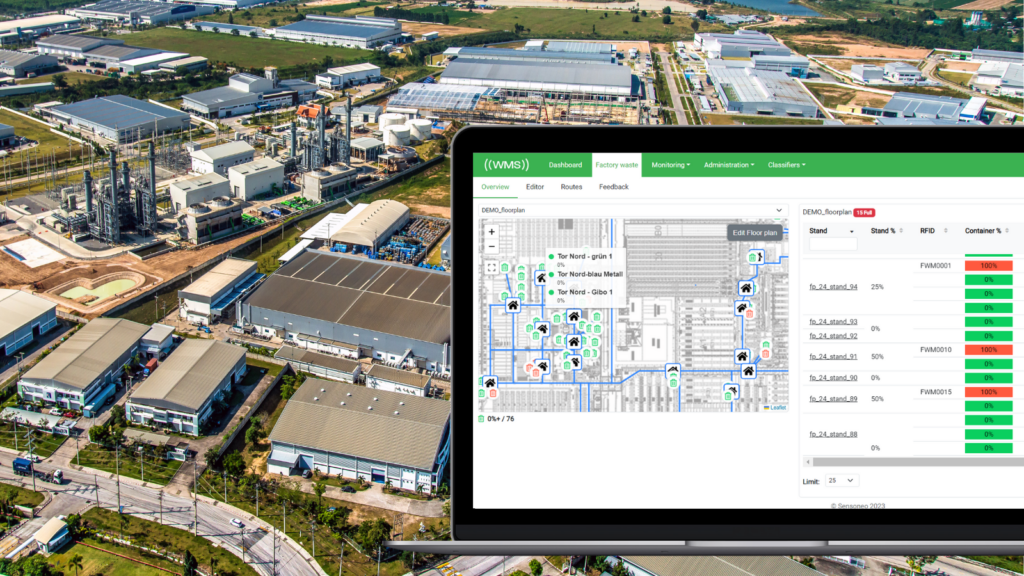
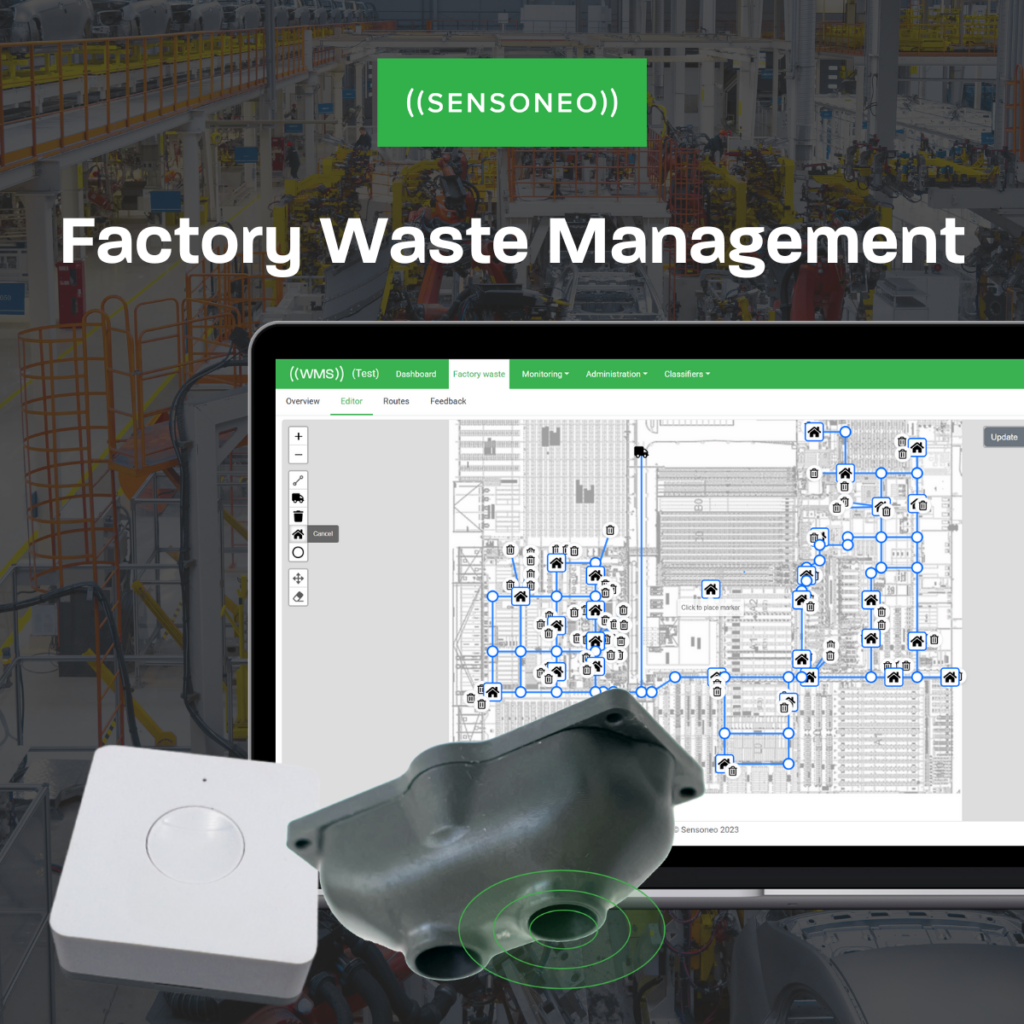
In todays interview we had the pleasure to talk with Mrs. Silvia Braghini from AHK Italy. She is Project Manager for Market & Business Development in Milan and shares with us her thoughts about the Italian startup landscape and what part the AHK Italy is playing in this ecosystem.

Mrs. Braghini, what role is the AHK playing in Italy's startup scene?
The AHK Italy has been working on establishing its presence in the Italian Innovation ecosystem for several years by now. The partnership with some of the most influent Innovation facilitators and players across Italy, among all universities, accelerators, incubators, hubs, research centers and banks that support accelerator programs and invest on startups, gives the AHK Italy the possibility to experience the innovative pulse of Italy and in several occasions also to be part of it.
Given the strong pragmatical approach of our Chamber of Commerce our main goal in this context is to connect the world of industry with the innovative world and in this sense, we try to create concrete business opportunities for the Italian startups and to connect them with potential business partners, through different initiatives and partnerships, but mainly thanks to our own start-up contest “Business Meets Innovation”.
How are startups changing the economic landscape in Italy? Are there regional differences between the scenes from Milan to Campania?
The Italian economic system nowadays demands more and more to reinforce the collaboration between SMEs enterprises and big companies and to connect the world of research and development with the industry. A big part of the measures of PNRR, Piano Nazionale di Ripresa e Resilienza (the NRRP, National Recovery and Resilience Plan) is dedicated to accomplishing these goals and one of the main drivers are startups.
In the past few years the concept of generating innovation through a Bottom-Up approach has been attracting many Italian companies and institutions and is allowing them to rethink their business models and their priorities for the future.
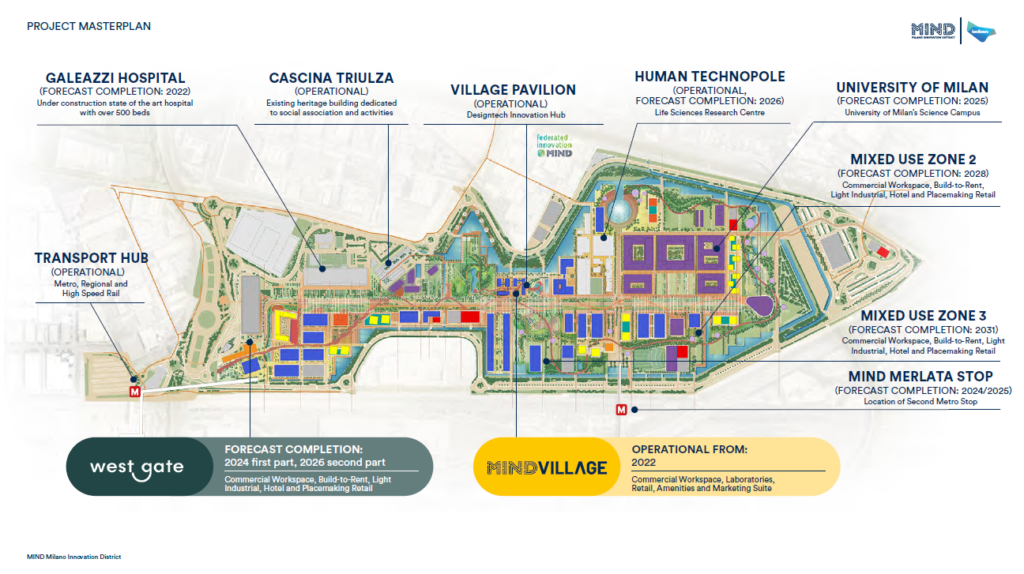
The main innovation areas in Italy can be found in the most industrialized and progressive regions of the country; the most significant areas are the following: Lombardy, particularly in the surroundings of Milan, Emilia Romagna, Piedmont, and Veneto. However, in the last years there has been a considerable increase of awareness of the startup ecosystems in the South of Italy, especially in the regions of Lazio, Campania, Tuscany, and Apulia. These regional ecosystems arise for the most part from renowned University Hubs (respectively Politecnico di Milano, Università di Bologna, Politecnico di Torino, Università degli Studi di Padova, Università degli Studi la Sapienza, Università degli Studi di Napoli Federico II and Politecnico di Bari) and are based on the research departments of the universities. They develop their expertise and are the basis for the creation of new business ideas and solutions. Beside that these regions and innovative centers are supported by some very solid incubators and accelerators, as Polihub and ComoNExt (Lombardy), Lazioinnova (Lazio), 012factory (Campania), Almacube (Emilia Romagna), i3p (Piedmont).
What makes Germany so attractive as a destination for Italian startups?
Given their expertise and approaches, as German-Italian Chamber of Commerce, we can say that the combination und exchange in between German and Italian companies are in practically any sector a pretty good match, or even better to say, they are often quite complementary.
In the innovative sector the Italian talents are attracted by the German economic system, due to its solidity, progressive commitment, dedication to research and development activities and pragmatic approach.
The only fact that Germany is divided into regional innovative Clusters, based on their focus field, makes it easier for the Italian startups to find their way around and creates a solid base of trust, in order to establish the Italian expertise in Germany.
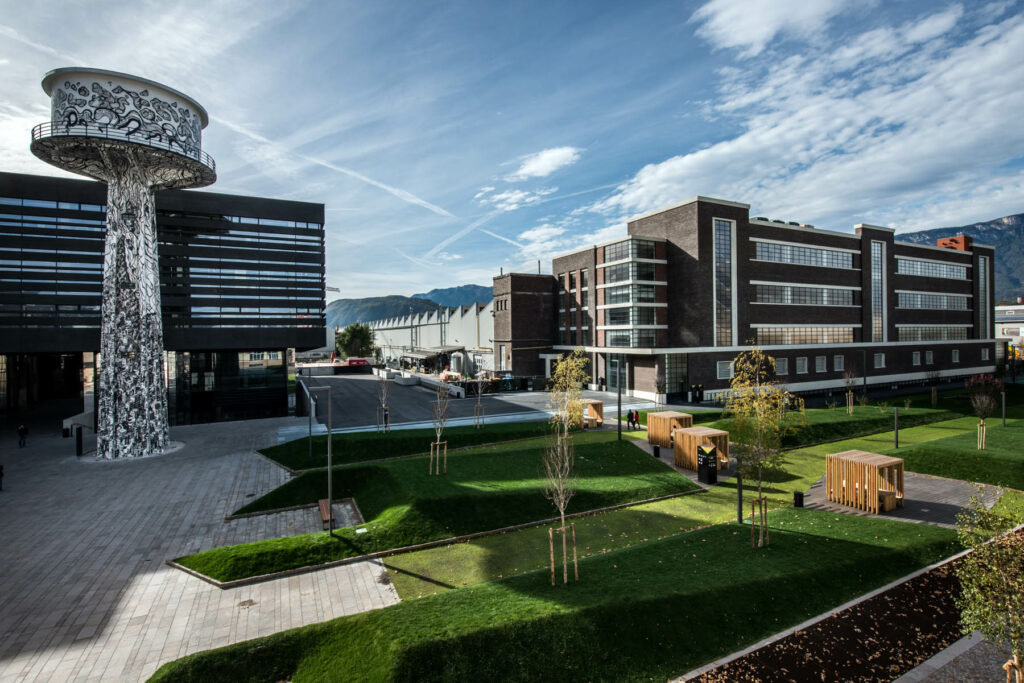
What piece of advice would you give to your startups participating in the tour?
To our Italian participating startups, I would say that they have the important mission to show the German investors of the Ruhr region what drives Innovation in Italy and why it’s worth it to explore our ecosystem and to support it!
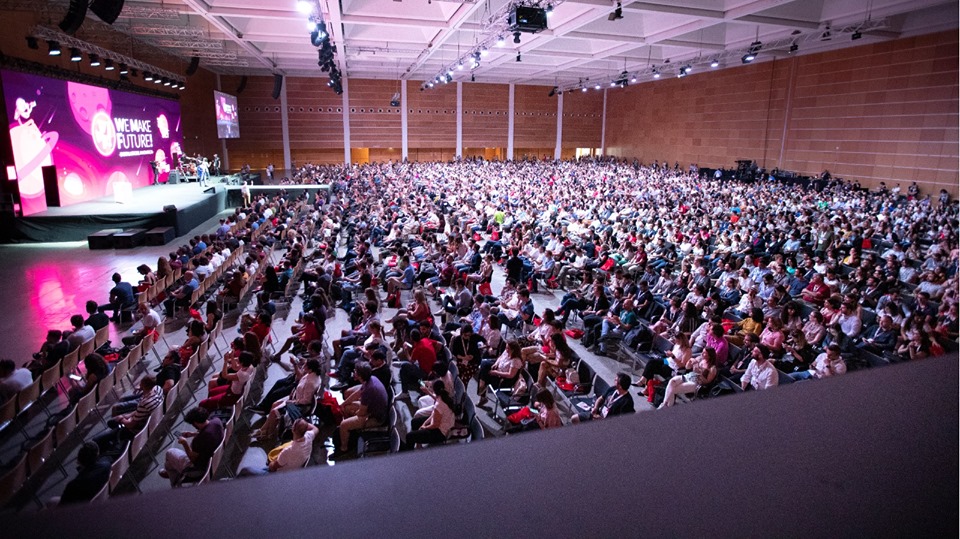
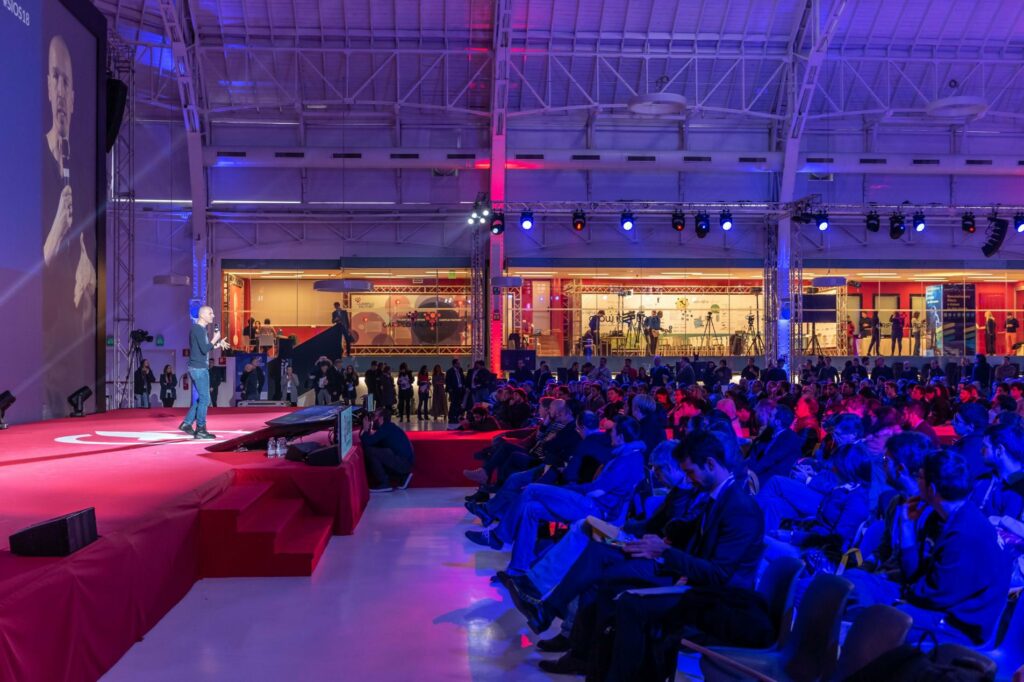
Moreover, I would recommend them to present a clear purpose of their solutions and a concrete business model, but yet to maintain the creative and flexible marks that characterize any Italian entrepreneur. This is definitely the key for our Italian startups to establish their presence and to succeed in Germany and worldwide.
A sector report about Germany's industrial heartland North Rhine-Westphalia
The industrial revolution transformed Germany in the late 18th century from a predominately agrarian society into the economic powerhouse in Europe. The seed for this rapid metamorphosis was planted in the coal rich regions of the Ruhr and Rhine, modern North Rhine-Westphalia. Till this day, the landscape of NRW is dominated by its industrial history. Facing ever stiffer competition globally as well as further challenges, NRW is determined to revolutionize and vitalize its industry, actively placing itself at the forefront of technological innovation for industrial solutions.
Facts & Figures
Today, with its nearly 18 million inhabitants, nearly one in five people of workforce, roughly 1.2 million people, in NRW is currently working in the industrial sector, mainly as mechanical engineers. In 2020, the industry generated roughly 320 billion euros in sales alone. That is 18% of Germany’s industrial sales concentrated solely in one single state. Furthermore, with its 710,000 SMEs, the German “Mittelstand” is still the backbone of the region’s economic force, contributing to more than 20% of Germany’s GDP. In addition, one in four market champions or hidden champion is at home in NRW, which further underscores the state’s economic strength.
But besides the classical industry actors and fields, NRW is also home to innovation which is greatly appreciated by the local industry. For instance, already 25,000 ICT companies have settled in NRW, generating nearly a third of all ICT generated revenue in Germany, totaling over 103 billion euros. Going even beyond that, NRW has already attracted 20% of all startups active in Germany, supplying even more radical innovation to the local industry, allowing local businesses to fully harness the practical insights and modernizations associated with the startup scene.
One example of such radical innovation is the nano-technology sector. Already 22% of Germany’s nanotech firms have set-up a business in NRW as well as 28% of all microsystems and technology companies.
Pioneering Germany's Industry 4.0
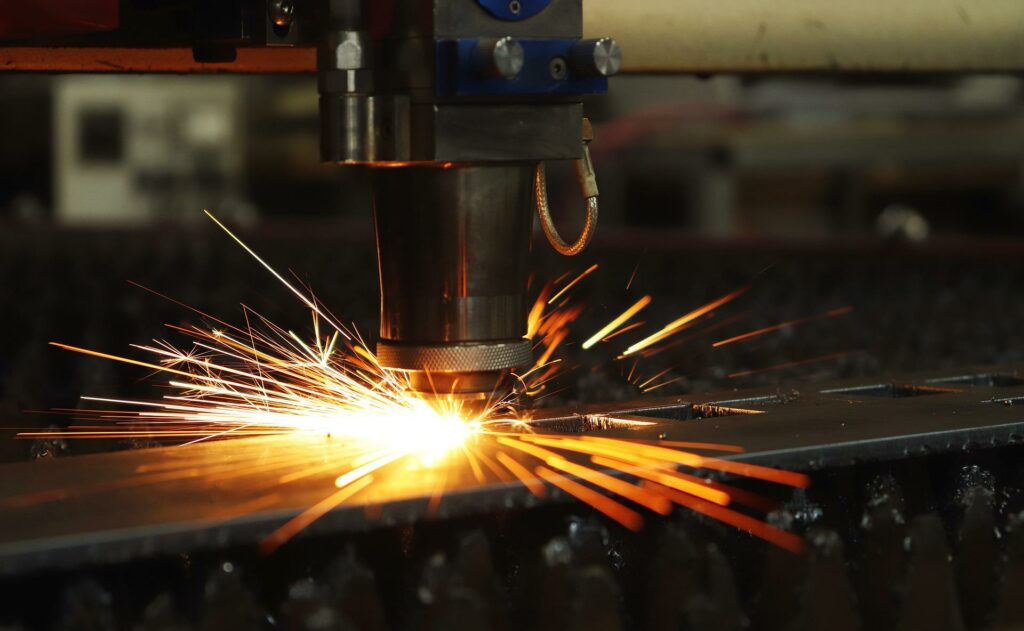
NRW is offering immense opportunities for any company and startup that is seeking to contribute to innovative industrial solutions and making the fourth industrial revolution not only a reality but also a success story. Being the industrial core of the continent and Germany, NRW is home to a truly broad industrial customer base from chemistry to machine manufacturing to electronics and electrotechnology, NRW has it all. Hence, there will be a niche for everyone to drive forward and build up owns company. Going even beyond the potential German industrial customer base in NRW, the state also offers quick access to over 160 million people in 500km radius, possessing roughly 3.5 billion euros in purchasing power.
In addition to its industrial advantages, NRW has plenty more to offer such as its leading research and education institutions. The former provide the perfect fertile ground for young and innovative companies to test and further improve their ideas, benefiting from the exchange between academic insights and practical needs and applications. These research institutions include, above all, the Fraunhofer Institutes such as Fraunhofer FIT or the Centrum Industrial IT (CIIT e. V.). Currently, there are over 780,000 students in NRW, studying at one of the 68 universities in the region such as the TU Dortmund, Ruhr University of Bochum or the RWTH Aachen. Roughly 27% of these students are attending classes and programs at technical colleges, guaranteeing a talented and well-educated workforce. Thus, it is little to no surprise that NRW is already leading in language modes research and quantum machine learning. Going even further, NRW is soon to be the home to Europe’s fastest computer, based on exascale computing, enabling faster and more accurate processing and numerous applications for forecasting models.
Pushing and facilitating the transformation of its industry and cities in the digital age, NRW is keen on rolling out flagships and other initiatives to foster innovation. One player in the region that is dedicated to harnessing the advancement of artificial intelligence is KI.NRW. Working together with local stakeholders from politics to civil society, companies, and academia, KI.NRW is actively applying AI. One such program is the application of AI to hospitals or mobility, transforming not only the industries, but also creating smart cities.
Ecosystem Industrial Solutions
To foster innovation and to provide startups with a suitable growth environment, NRW has launched many clusters and hubs to improve the region for young entrepreneurs. Some of these hubs are the DigitalHUB Aachen, Digihub Düsseldorf or the digital Hub münsterLand. All of which are dedicated to help young companies to network and provide access to key stakeholders in the region. Next to the hubs are the clusters. Based on the industry and technology, these clusters can vary. For instance, the blockchain technology has four distinct clusters in NRW, one in Aachen, due to the RWTH Aachen as well as in the cities of Dortmund, Essen, Cologne and Bonn. One player and facilitator on blockchain is the Blockchain Reallabor, building up a European blockchain institute in NRW to conduct research and practical application for the technology in the industry and logistics.
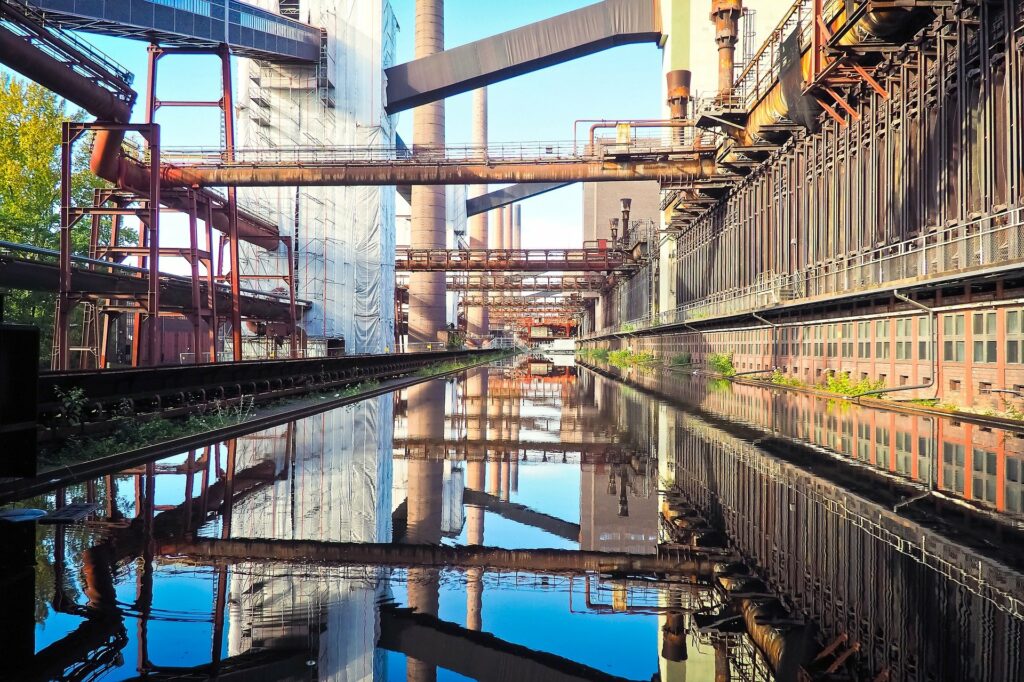
Another prime example of the great ecosystem are the co-operations between businesses and research in the state is the technology network “it’s OWL” (focusing on the region of Ostwestfalen-Lippe). Founded by government support as a technology network in 2012, “it’s OWL” has realized over 47 projects worth 100 million euros already and is currently planning to double the funding to 200 million euros over the next rounds of projects. One flagship project is the building of a smart factory with the Fraunhofer IOSB-INA, allowing for the testing of automatization and digital applications to the production processes. In its next round of projects, the “it’s OWL” is dedicated to further explore the potential for AI in optimizing and enhancing industrial manufacturing. These factors have greatly contributed to settling advanced industries and innovators in NRW. Furthermore, Dortmund, one of the urban centers of NRW, has been transformed to Europe’s biggest micro-tech cluster, employing over 2,200 employees among 40 companies in the industrial sector.
Trusted Partners
For any company, but especially for international ones seeking to expand or settle in new markets, reliable partners are key. Luckily, NRW provides such networks of great partners, sharing their access, resources, and insights with their respective networks. In the area of funding, NRW’s most trusted source of finance is the NRW.BANK, providing low-interest loans to both startups and SMEs north of 10 million euros as well as seeding capital for young founders. One dedicated program by the NRW.BANK is the “NRW.BANK.Digitalisierung und Innovation” program. As previously mentioned, one key partner is the “it’s OWL” in the industrial solutions sector, raising their funding capacity up to 200 million euros for future projects. Another source of funding, although at a smaller rate offers the “regional economic promotion” programs (RWP) in NRW, seeking to vitalize urban economies by allocating cash grants to businesses. Other partners are also participating in the Start.up! Germany Tour such as NRW.Global Business, the federal investment agency of the state. Or the Institute for Digital Future Technologies e.V., seeking to raise awareness and provide key access to an extensive network of potential customers and partners in NRW. And last but most certainly not least, there is the network of local chambers of industry and commerce (IHK) in Germany. The chambers, such as the ones organizing and participating in the tour are vital business partners in Germany, offering a wide array of services and advice for their local businesses, reaching even to the political centers in Berlin and Brussels.
If you want to hear more about this excting sector feel free to rewatch our corresponding webinar here:
A sector report about the infrastructure of sustainable technologies in North Rhine-Westphalia
The industrialization introduced radical change to the world, its people and to the economy, mostly at the expense of the environment. Germany is no exception to this rule. However, the country is determined to embark on the transition to carbon neutrality till 2045, signaling that economic progress does not have to be at the environments expense. North Rhine-Westphalia, the cradle of Germany’s industrialization is vital to this process. Having greatly benefitted from its natural riches of coal and steel production, NRW has been the engine of Germany’s industrial progress and forms till this day Germany’s industrial core. Confronting its industrial heritage, NRW seeks innovative solutions in greening its economy while maintaining its prosperity.
Facts & Figures
Building on its industrial history, NRW’s local economy is the 6th largest in Europe and even the 18th in the world, making it an economic powerhouse. Already today, the green tech sector contributes 6% to the gross value added in NRW, adding value north of 35 billion euros. Similarly, the sector has steadily grown by 1,9% annually since 2009, employing 468,000 people, predominantly in the service, construction and manufacturing sector. Further, one third of its revenue is generated through exports, indicating rising demand for greening services among NRW’s neighbors. Additionally, with the ongoing pressure to shift away from energy generated by fossil fuels, the domestic industry, consuming nearly 30% of Germany’s energy, is looking for alternative, green and innovative solutions, reducing the consumption of fossils while gaining efficiency as well as green sources such as hydrogen. Hence, to meet the current demand of 104TWh annually and 42TWh from its industry alone, the government of NRW has launched its own variant of a hydrogen roadmap, aiming to foster a domestic hydrogen market.
Greening Germany's industrial core - NRW

NRW offers great opportunities for the green tech market. Not only is the state home to a dynamic economy, generating 773 billion euros and an industry contributing over 50% to this, 356 billion euros. The region is also home to over 700,000 SMEs, hence offering a huge variety of potential customers, business partners and cooperation for green tech firms, seeking to enter the German market. Furthermore, as every fourth market leader in Germany is located in NRW and the local industries are emphasizing the need to transition, demand for innovation is on the rise. Already today, many new industrial and business parks are being created, targeting especially green tech, such as the EUREF Campus Düsseldorf or the Smart-Tec Campus Wuppertal.
In addition to an immense potential of serving to a broad variety of industrial customers, NRW also offers some of the leading institutions in scientific research and education the country, such as the Wuppertal Institute or the Fraunhofer institutes Umsicht and IAIS. Similarly, in education, nearly 800,000 students are currently learning and researching in NRW. 40% of which are coming from the MINT-fields, promising a rich pool of talent for the green tech sector. Furthermore, NRW hosts more than 30 courses and programs that are directly targeting green tech. Leading education facilities are the TU Dortmund, the RWTH Aachen or the Ruhr Universität Bochum. Next to the supply with leading talents, the research and education institutions in the state are also open to foster common exchange and projects with the companies, enabling the transfer and application of newest insights from the scientific frontier to the practical needs of the companies.
Finally, being aware of the great challenges in transitioning the local economy to carbon neutrality and energy efficiency, the central as well as local government is actively supporting the settlement of innovative green tech companies in the region. For instance, there is the previously mentioned initiative to create a domestic production and industry of hydrogen, being supported by the Package for the future, allocating over 7 billion eurps in building up this market as well as 2 billion euros to foster international partnerships to meet the increasing demand and compensate for the lack of domestic supply. Besides the hydrogen roadmap, the public sector is also keen in supporting the construction sector in becoming greener and more energy efficient by launching new building projects for commercial properties, harnessing the innovative solutions and material provided by the green tech sector.
Ecosystem Green Tech
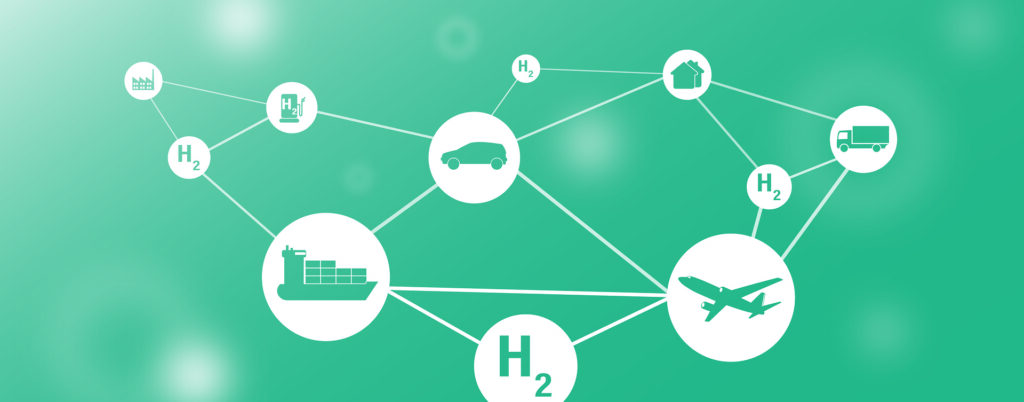
Due to its many advantages, NRW is home to a perfect ecosystem for green tech companies in Germany. The region is already home to many networks, clusters and accelerators, such as Kompetenznetzwerk Umweltwirtschaft NRW (Network for Competence and environmental economy), NRW.Energy4Climate and Circular Valley. The latter is cooperating with over 35 startups already on the globe to raise international awareness for green tech and to combat climate change at an international stage. Further, as already mentioned, NRW houses excellent research institutes as the Fraunhofer Institutes or the Jülich Research Center, producing key insights and vital progress for startups and entrepreneurs to tackle challenges and develop their ideas. Some of this has already led to innovative and groundbreaking projects and programs in NRW. For instance, dedicating themselves to the implementation and development of digital and artificial intelligence as source of green tech solutions, there is the Competence platform AI in NRW, KI.NRW.
Trusted Partners for the transformation
In order to successfully facilitate the growing market for green tech and to support the young innovators, NRW provides many great partners and their respective programs to realize the potential of green tech. One key component of this is of course funding. The latter can be achieved either by private or public investors. For both of which ZENIT is providing the suitable network and advice. Another source is the NRW.BANK, offering low interest loans for up to 10 million euros over 5 years via its NRW.BANK.Gründung und Wachstum or the NRW.BANK:Elektromobilität programs. For additional networking in the region, there are many great initiatives such as NRW.Energy4Climate or Greentech.Ruhr, fostering lasting links and cooperation among businesses, test labs and funding opportunities. Another vital partner is the region and across Germany are the local chambers of industry and commerce (IHK), offering strong advice and assistance to all companies in their respective district. Advising on crucial business issues and regulatory affairs, the IHKs are well suited to assist in any situation and to guide businesses in the region.
If you want to hear more about this excting sector feel free to rewatch our corresponding webinar here:
